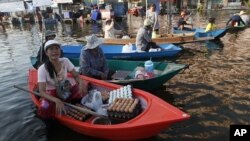After devastating floods, Thailand’s bruised economy is depending on the impact from government flood support funds, pent-up domestic demand and renewed corporate investment to spur growth. But an uncertain international economic environment may also prove to be a challenge for recovery, going into 2012.
In central Bangkok, street markets and department stores are again filled with shoppers and bargain hunters.
Mr. Aungladeth, who operates a small clothing store, says consumers have returned and he hopes 2012 will be a better year after the last year’s floods.
“After the flood they are coming to buy new clothes or new shoes. [But] many shops closed because of the flooding," he explained. "2012 I think its better, better than last year. Many things happen last year like the flooding.”
Flooding that began in July claimed more than 800 lives and cost the economy up to $45 billion. Thai economic growth plunged in the final quarter of 2011 as water inundated vital farmland and industrial estates on the central plains. By December, Thailand’s annual economic growth was just above 2 percent.
But the economy is slowly picking up
On Monday, the state think tank, the National Economic and Social Development Board (NESDB) said investment and exports will be key economic drivers in 2012.
The NESDB forecast investment growth to reach more than 10 percent, from four percent in 2011. Household consumption is also set to rise. The government’s Fiscal Policy Office is pitching annual growth at 5.0 percent.
Thai Deputy Prime Minister Kittirat na Ranong is confident growth could reach close to 7 percent, aided by government flood recovery spending that is set to exceed $11 billion.
But Thai consumers are also fretting about inflation, with prices on the rise since the floods receded. Thai construction executive Mr. Surapong, says price inflation is hurting consumers.
“Inflation is so high, very high. Everything is expensive after the flooding," he said. "All of it - food, is especially expensive, so expensive. 2012. I think GDP [gross domestic product] will grow up about 5.0 percent - not 7.0 percent. Last year 2.5 percent - 5.0 percent can do.”
An United Nations assessment warned about the flood’s wider impact on the fertile central plains, which account for nearly half of the country’s agricultural output.
The region is also home to several major industrial estates producing automobiles and computer hard disk drives.
Thailand is the world’s second largest hard disk drive producer. The production disruptions to global production chains are expected to affect computer manufacturers into early 2012. Shortages have already led to higher prices for hard disk drives.
But Suphavud Saicheau, managing director of Phatra Securities, says many Thai businesses are already on their way back to recovery.
“It looks like the economy has bottomed and so hopefully the first quarter and you will see and improvement," Suphavud said."We haven’t seen anything to indicate any recovery. But I highly suspect that we will have a recovery because industrial companies - the corporate - have been busily restructuring and repairing. So far the economic figures have been atrocious because they reflect the height of the losses from the flood damage.”
U.N. economists also warn export dependent economies such as China, Malaysia, the Philippines, Korea, Singapore, Taiwan, Thailand and Hong Kong, also face a threat of an export slow down because of the economic uncertainties in European markets.
But the U.N. Economic and Social Commission for Asia and the Pacific, in a December report, says trade within the Asia Pacific region should provide a key boost to the Thai economy.
After Devastating Floods, Thailand’s Economy Bounces Back
- By Ron Corben




